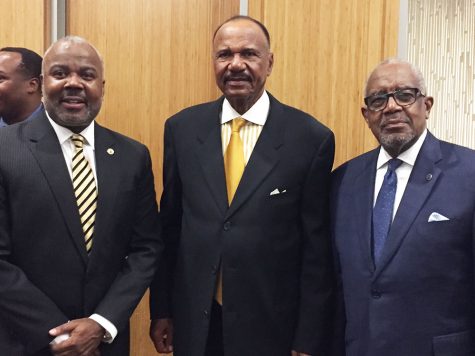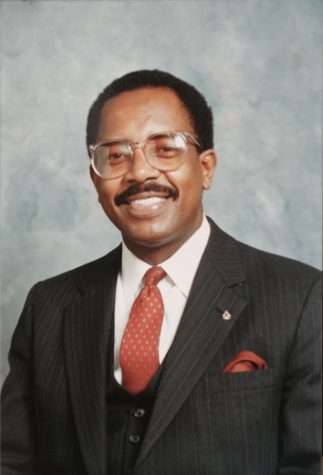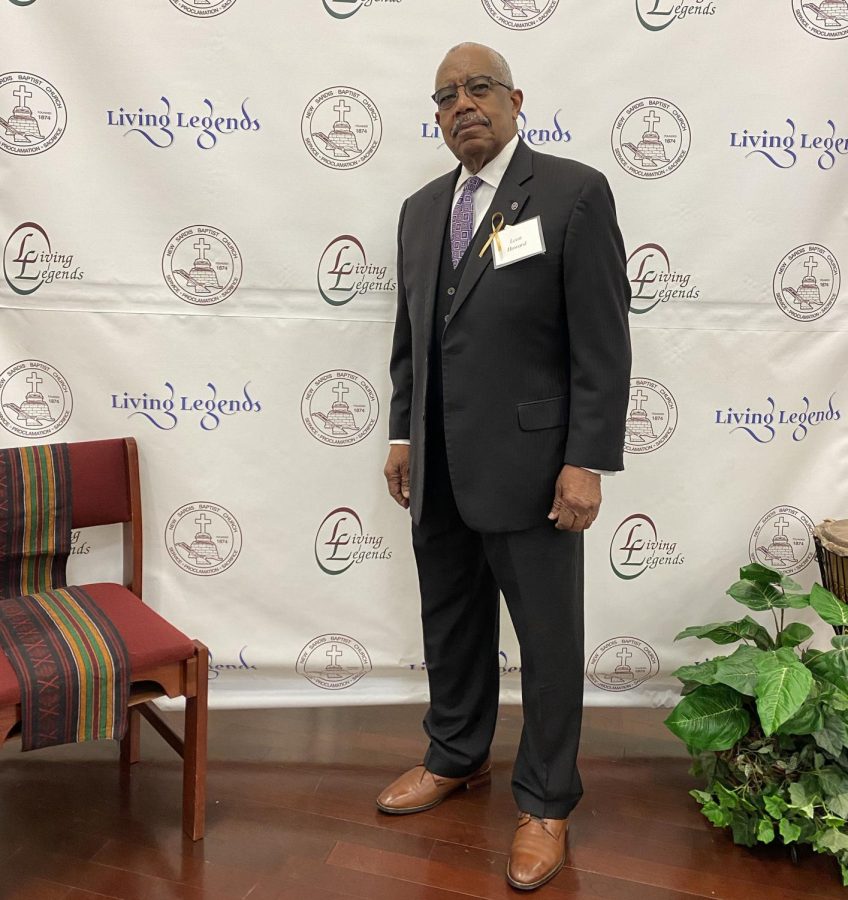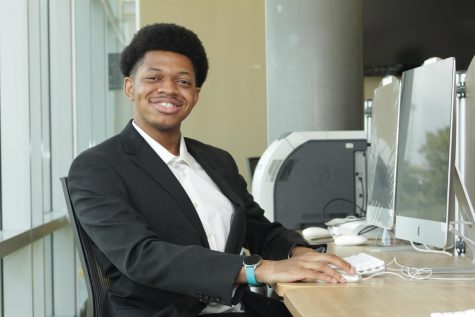Howard encourages students to find purpose in life
Former Student Government Association president, alumnus, and eighth president of Alabama State University Leon Howard, Ed.D., accomplished so many groundbreaking innovations, systems, and programs during his tenure as president, including the creation of Bessie Sears Estell Hall and Martin Luther King Hall, a tactic used to raise enrollment drastically.
November 27, 2021
While many often struggle to find their purpose and meaning in life, a select few are brought up on strong morals and values that are instilled at such a very young age. Having a mission set in life not only provides structure and security but allows for an individual to soar beyond their trajectory and expectations. With the mission to surpass his parents, Alabama State University alumnus and eighth president of Alabama State University, Leon Howard has served several leadership roles across eight HBCUs, pressurizing his life mission into diamonds.
By being thoroughly entangled in the world of leadership throughout his time at O’ Mother Dear as a student, Howard used his vibrant and resilient mindset to institute and establish several academic programs, residential halls, scholarships and student organizations at Alabama State University that are still thriving today.
Of course, with anyone’s origin story, it takes a village.
Growing up in a household with nine other siblings in Mobile, Alabama, Howard’s family faced adversity and hardship in the segregated south. His parents, Eddie and Essie Mae Howard, had three sets of twins, with Howard being a part of one set and were making a limited amount of money. With such an interesting family dynamic filled with sacrifices and struggles, Howard was determined to succeed.

“My father did not graduate high school, and my mom attended one year at Alabama State University,” he said.
In his youth, Howard had several jobs around his community thanks to his parent’s influence. As the local paperboy, Howard was responsible for delivering the mail in a timely manner. Along with being a paperboy, he worked at a grocery store, saving up his money for the future.
“I wanted to do everything that they inspired me to do so that I could have a better life than what they had,” he said.
Even through the obstacles, Howard’s family had a strong Christian faith as they were in church four days out of the week. From Boys Crusaders to Sunday school, he was fully immersed in the religion, and his parents ensured not only his financial stability but his spiritual one as well.
Now part of Bishop State Community College in Mobile, Alabama, Howard attended Central High School in 1955, where he flourished in the Paramount Social Club. As a member of the all-male organization, he participated in various social events around campus, including football games, halftime shows and the Madi Gras parade.
“It was really like your modern-day fraternities,” he said, something that would be all too familiar to Howard.
As most students go through high school having no prior relationships with their teachers, Howard was blessed to have some of the same teachers that taught his mother. Though this seemed to be a smooth pathway for Howard, his teachers expected more from him because of the high bar his mother set.
“The expectation was very high,” Howard said. “I had teachers who would always say ‘You are a Howard, and I know you can do better,’ whenever I became lax or didn’t turn something in.”
Being surrounded by various science classes, lab experiments and coursework, Howard gained a love for the sciences, and that love would continue for years to come. In 1959, Howard graduated from Central High School and found the perfect choice for college.
“Convenience” and “legacy” are two words that strongly describe Howard’s decision to attend the Mobile Branch of Alabama State University, now known as Bishop State Community College. His older brother, Everett Howard, graduated from the university, and Howard decided to follow in his footsteps. Additionally, since the school was not too far from home, Howard enrolled right away in 1959.
“Actually, the Mobile Branch [of ASU] was the best place for me since I wanted to become a teacher and the Mobile Branch was well-known for training teachers,” Howard said. “I really got a chance to launch my ‘high-end’ career thanks to the Mobile branch. But along with that, I could not afford anywhere else, so the Mobile Branch was the best option.”
Continuing his interest and love of the sciences while also converging his desire to serve his community through education, Howard declared his major to be general science education with a minor in physical education.
“I was really interested in anatomy and physiology, so I could put all that together in one bundle in neuroscience,” he said. “I worked in the science lab, and biology was my favorite. As a matter of fact, I wanted to major in Biology, but we didn’t have it at the time.”
It was at the Mobile branch of ASU that Howard was exposed to the leadership lifestyle. As a student, he served as freshman class president from 1959-60 then as the student council president the following year.
“That is when the bug bit me,” Howard said. “I loved serving my student body and community, and I still share that love till this day.”
After two years at the Mobile Branch, he transferred to the home branch of the university located in Montgomery, Alabama. Not only did Howard transfer to the university, but so did his leadership skills and positions. In 1961, he served as the dormitory council president, which really gave him his first look into student government.
As dormitory council president, he represented the student voices who resided on campus, listened to their concerns and negotiated with the city council and various other entities.

“There were always issues on campus, and some were pertaining to the dormitories, food services, and curfew,” he said. “So, I got the chance to be an activist on behalf of the students who lived on campus.”
Known for their manhood, scholarship, perseverance and uplift, Howard pledged Omega Psi Phi Fraternity, Inc. the same year he was dormitory council president.
In 1962, he served as the college council president, presently called the Student Government Association (SGA), further delving into his passion for leadership. In that position, he represented the university as a whole, creating student activity events and planning, budget allocation and communication between faculty/staff and the student body.
“That greatly prepared me for my future leadership roles,” Howard said.
Juggling so many different extracurricular activities, classes, and executive officer positions, Howard still kept his strong faith in God, recalling vespers to be one of his favorite college memories.
“It no longer exists, but basically every Sunday at 3 o’clock, you had to go to the vesper, listen to the preacher and the choir, and someone would give us some encouraging remarks,” Howard said. “I really enjoyed that.”
Along with vespers, the various social and sporting events on campus were a big hit, especially the Magic City Classic and Turkey Day Classic, becoming an annual tradition for many, including Howard.
“They were a big thing to us,” he said. “Even the regular football games played at the Markham Football Complex were big, and everybody, and I mean everybody, was there.”
Regarding academics, Howard truly appreciated the togetherness that the faculty had with its student body. He recalled having a personal relationship with most of his professors who helped mold and shape the leader he is today.
Though some of his classes were tough, Howard is very appreciative of all the memories made, connections kept, and lessons learned at the Hornet’s nest.
He graduated from ASU in 1963 with his degree in general science education and began teaching at Tipton High School in Selma, Alabama, the same year. He recalls his tenure at Tipton High School as an interesting experience as the American Civil Rights Movement was simultaneously taking place in Selma.
“Selma had a lot of demonstrations. They were gearing up for that march from Selma to Montgomery,” he said. “So, I became involved in all of that. I actually became an avid civil rights activist, which is really why I was only in Selma for one year.”
Dedicated to the school that cultivated and presented so many opportunities to him, he returned to his alma mater in 1964 to work as an assistant registrar, filing and documenting important information concerning admissions.
Not one year in his new position, Howard was drafted into the army during the Vietnam War and served as a military policeman in 1965. To his avail, Howard did not have to fight in the war as he had four other brothers in the army at the same time.
“I had one [brother] in Vietnam. So, because there was already one of us there, they couldn’t send another,” he said. “Instead, they sent me to Korea, where I did paperwork and everything else that a regular policeman would do.”
Once again returning to ASU, but not as the assistant registrar, Howard was promoted and served as the director of admissions and financial aid in 1967. While in this role, he received a fellowship that covered his tuition and fees to attend Indiana University in 1968 to get his master’s degree in student personnel, venturing away from science to administration.
“I didn’t want to go through the science route to get my master’s degree,” he said. “I was looking at how jobs were available at schools based on what your major was, and there weren’t that many good jobs. Plus, I’m just a student-oriented guy, and I loved working in student affairs, so it was the perfect choice for me to change my career path.”
Pursuing administration further, he received another fellowship, the Ford Foundation Fellowship, that awarded him the opportunity to attend Ball State University in Indiana in 1971 to receive his doctorate in higher education. Without the amazing financial compensation, Howard said he would have never been able to pursue higher education, erasing all of the future roles to come, including the presidency.
In 1973, he returned to Alabama State University once more as the vice president for academic affairs. He served in that position for three years before finally flying out of the Hornet’s nest and entering the tiger’s territory of Jackson State University in Jackson, Mississippi. At JSU, he was the assistant dean of academic affairs and the associate professor of education for seven years.
While at JSU, Howard made connections with several of the football staff, including Coach Houston Markham, which ultimately led both Markham and Howard back to Hornet Nation.
A now very familiar territory for Howard, in 1983, he went back to Montgomery and was appointed as interim president of Alabama State University, connecting his long leadership trajectory of being student council president to now interim university president.
One year later, in 1984, he was officially appointed as the eighth president of the illustrious university and was the first alumnus to serve in that position.
“We interviewed several people, and I got interviewed too,” he said. “I won out. I was the best candidate for the job, and at that point, ‘Alabama State’ was in my blood.”
On June 29, 1985, Howard was inaugurated as the eighth president – the second inauguration in the institution’s history.
With plans to build enrollment, raise money and develop new programs, Howard’s responsibilities were not for the faint of heart. They took an avid dreamer who could foresee the brightest possibilities and opportunities for the student body, and Howard fitted the criteria.
Though he was the face of the university, he was not alone. Howard had several vice presidents of student affairs and various others who assisted in his visions and goals for the school.
“I never dreamed for a long time that I would become president,” he said. “But just being around the right people that made me the presidency possible is a blessing.”
During his presidency, Howard accomplished so many groundbreaking innovations, systems, and programs, including the creation of Bessie Sears Estell Hall and Martin Luther King Hall, a tactic used to drasticallyraise enrollment.
In 1988, there were 1,312 freshmen (ASU’s second-largest freshman class at the time) out of 4,045 students enrolled in the fall, a 44% increase over the previous year.
“Once you convince people of your idea, the rest will follow,” Howard said. “And so I convinced the board of trustees to build two new dormitories, and I said ‘We’re gonna get more students and we’re going to offer more programs.’”
Along with the two new additional halls, he created the Golden Ambassadors, a highly selective group of outstanding students serving as the official greeting body for Alabama State University, ASU Today, an ASU-focused magazine, and various other organizations that encouraged student engagement and involvement.
“The Golden Ambassadors are basically like the public relations arm for the college because when you saw those people, they got your attention,” he said. “Those blazing gold jackets were representatives of the school and were virtually leaders.”
Enrollment increased significantly for the third straight year in 1989 to 4,456 students, a 10% increase over the previous year. Alumni chapters also increased, with 65 chapters across the United States by that same year.
The creation of more alumni chapters allowed Howard to create the Endowment for Excellence, which is money received by alumni, foundations, associations, estates and other sources that offer future Alabama State University students scholarships, in which he raised $1.5 million.
“I believe that the alumni clubs of different cities were the most instrumental in helping to build that scholarship for excellence,” Howard said.
Academic scholarships such as the presidential, academic excellence, academic incentive, and black and gold scholarship were all created under Howard’s leadership.
Students with the highest grade-point averages, great leadership skills, and a well-rounded personality were awarded those full-ride scholarships to attend ASU, and Howard made sure to offer commitments on the spot.
“I would tell them, ‘If you come to Alabama State, I’ve got a full scholarship for you,’” he said. “We also did college fairs where we had someone go out and recruit. That’s how you bring more quality students to your campus and build on enrollment.”
Getting the students to enroll at the university was one task but keeping them enrolled and retained was quite different. To combat this issue, Howard created a student retention program to assist students academically, socially, and professionally since most were entering a new learning environment.
From the tutoring and academic labs to the academic counselors, Howard wanted to ensure the success of every student that attended the university during his tenure.
“We’ve got to diagnose the problem as to why a student isn’t making A’s and B’s and then do something about it to help them achieve those goals,” he said. “The idea was to recruit and retain until graduation, so I made it my mission to make that happen.”
Creating a holistic college experience, Howard hired Coach Markham from JSU as the head coach of the ASU football team a few years into his presidency.
“I had a good relationship with four or five coaches,” he said. “So, when we had a vacancy at Alabama State, I think four of the assistant coaches at Jackson State applied for that position. And Coach Markham was the one that we appointed.”
Presently, the old football stadium is named after Coach Markham: the Houston Markham Complex, which has been transformed into a two-story facility and practice track for various sports.
Ending his presidential tenure in 1991, Howard supervised the accomplishments and completion of the WVAS-FM Radio Station, Women’s Basketball Team SWAC Champions, East and West University Apartments, graduate program in criminology, and the largest Title III continuation grant at the time.
While his journey as president ended at ASU, this was undoubtedly just the beginning for Howard as he served as the executive assistant to the president at Morgan State University in Baltimore, Maryland, in 1993. In 1994, he moved to Jackson, Tennessee, to pursue his next position as vice president for student affairs at Lane College. After Lane College, Howard ventured to Texas College from 1998-2002 as the vice president of academic affairs. Next, Barber-Scotia College called his name from 2002-2005, serving first as the executive assistant and then the acting president.
16 years later, on June 30, 2021, Howard retired from Rust College in Holly Springs, Mississippi. From 2005-2021, Howard was the chair of the division of education. He was responsible for the faculty who taught education courses in preparation for becoming a teacher.
Howard fondly remembers preparing his teachers for the rigorous Praxis examination that allowed teachers to become certified and licensed educators.
“Seeing the teachers I prepared for the test actually pass the exam is absolutely amazing,” he said. “I got the most joy out of knowing that people qualified for their teacher’s licenses.”
Looking back 58 years later, Howard greatly appreciates Alabama State University for reaching back and investing in him. He is thankful for the many opportunities of leadership and service provided that guaranteed a smooth transition into his professional career.
“I am so thankful for all the different positions available as a student,” he said. “I was always in charge of something, and ASU instilled in me to be the best that I can be. I didn’t strive to be mediocre.”
In his personal life, Howard recently moved to Tallahassee, Florida, to be closer to his children, Ravi Howard and R. Jai Gillum, shared by his former wife Caroline Howard, a former professor at ASU. Howard’s son Ravi attended Howard University and currently teaches at Florida State University. Ravi is a fictional author of Driving the King and Like Trees, Walking. R. Jai is the director of development at the Florida Dental Association and attended Florida Agricultural & Mechanical University (FAMU).
As the COVID-19 pandemic continues, Howard plans to travel back to his alma mater very soon for the Turkey Day Classic.
“My first trip will be going to Turkey Day Classic,” he said. “I’ve stayed a bit restricted and haven’t gone out due to COVID, but that’s my first priority.”
After Turkey Day Classic, Howard plans to go visit some of his brothers, do some volunteer work at his local library, and anything else that he desires to remain active.
He encourages his fellow fraternity brother and ASU’s 15th President, Quinton T. Ross, Ed.D., and future presidents to “have a goal and a plan and make that goal and plan come to fruition.”
To all of Hornet Nation, he urges the student body to always remember the true purpose of college – education.
“Stay in the books,” he expressed. “Have a goal. There’s no need to go to college if you don’t know why you’re there. Also, have a plan and work toward that plan.”
Serving 20 years in administration at Alabama State University and 30 years at other various HBCUs, Howard is the epitome of manifestation and transformation.
“Life is all about purpose, so what’s yours?”









Frances Bumbrey • Dec 23, 2021 at 9:02 pm
I certainly enjoyed reading about Dr. Howard, whom I’ve known for many years, and so very proud of his accomplishments, for himself and what he did for the University.
To return as an Alumnus to become the President makes us all very proud of him.
Frances W. Bumbrey/ Class of 1968.
Frances Bumbrey • Dec 23, 2021 at 9:02 pm
I certainly enjoyed reading about Dr. Howard, whom I’ve known for many years, and so very proud of his accomplishments, for himself and what he did for the University.
To return as an Alumnus to become the President makes us all very proud of him.
Frances W. Bumbrey/ Class of 1968.
Doris • Dec 23, 2021 at 8:33 pm
Thanks for sharing your life with us. Doris Stoutermire -Chambers
C/0 1965
Peggy Howard • Dec 23, 2021 at 12:47 pm
Congratulations on your success and retirement. Continue to live your Best Life. Much love to you Cousin